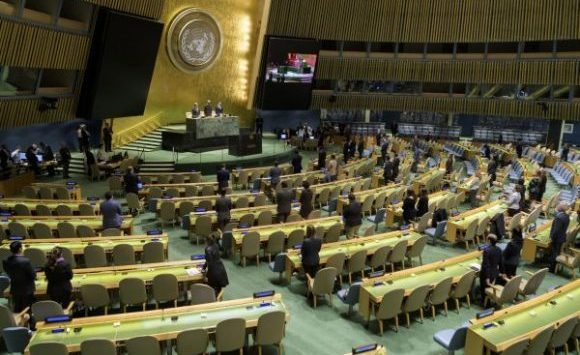Brazil wins seat on UN Human Rights Council
Brazil’s election does not give the government carte blanche to act however it wishes on the Council
 UN General Assembly Hall in New York (USA) where the election of 14 new members of the Human Rights Council took place
UN General Assembly Hall in New York (USA) where the election of 14 new members of the Human Rights Council took place
On Thursday 17th, Brazil guaranteed its seat, with 153 votes, for another mandate of three years on the UN Human Rights Council,. This is the most important inter-governmental organ responsible for strengthening and promoting the protection of human rights around the world. With its election Brazil will be able to propose and vote on resolutions.
Along with Brazil, Venezuela and Costa Rica were also competing for the two seats available to the Grulac (the Group of Latin America and the Caribbean). Costa Rica entered the competition just three weeks ago. Once all the votes had been counted, Venezuela had won second place with 105 votes and Costa Rica had only 96 votes.
- To find out more: How the elections for the UN Human Rights Council work
From the outset, the Brazilian state’s request for a new mandate on the Human Rights Council was controversial. Under Bolsonaro’s management, Brazilian diplomacy has taken an ideologically conservative turn, going against its historical stance on matters such as drugs and sexual and reproductive rights, has offended the memory of the father of the UN High Commissioner for Human Rights, Michelle Bachelet, who died during the Pinochet dictatorship and has attacked and upset Brazilian defenders present at the Council. In light of this, for the first time Conectas declared it was against the Brazilian candidacy.
According to Camila Asano, Programme Coordinator at Conectas, Brazil’s election does not mean the government has carte blanche to act however it wishes on the Council:
“As a member of the Human Rights Council, the Bolsonaro government is subject to even greater public scrutiny of its actions before the body and in relation to its domestic policies.” Asano said. “UN rules include the possibility of an elected member being suspended or even expelled.” She added.
She cited the example of the case of the Philippines who was this year the target of a resolution on its human rights situation in the context of extra-judicial executions resulting from its so-called ‘war on drugs’, despite being a member of the Council.
“Civil society will continue its work of denouncing violations of human rights in the country, as well as monitoring Brazilian foreign policy and calling for the international community to pay greater attention to this scenario.” Asano concluded.
The elections today elected a total of 14 new members to the Human Rights Council. See here for further information (in English) on the countries elected.


